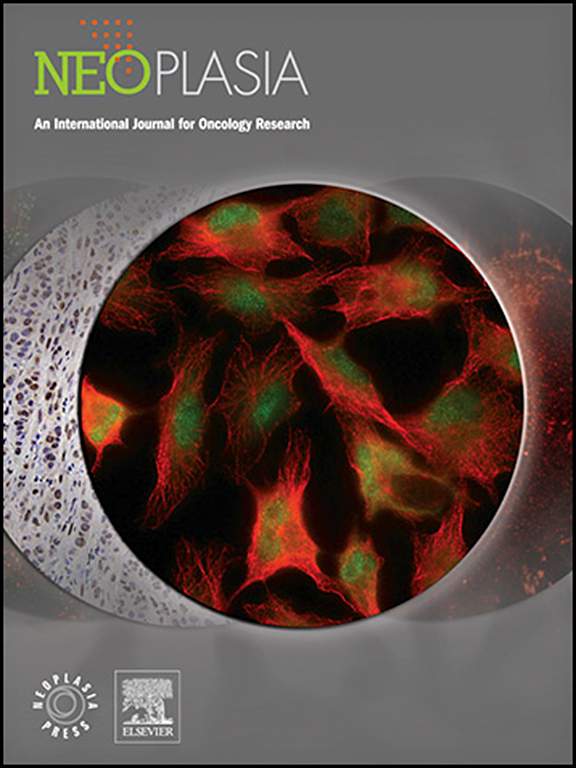L-methionine promotes CD8+ T cells killing hepatocellular carcinoma by inhibiting NR1I2/PCSK9 signaling
IF 7.7
2区 医学
Q1 Biochemistry, Genetics and Molecular Biology
引用次数: 0
Abstract
Background
Liver cancer has consistently high incidence and mortality rates among malignant tumors. PCSK9, a target for hypercholesterolemia therapy, has recently been identified as an inhibitor of anti-tumor immunity, and targeting PCSK9 effectively inhibits tumor progression. However, small molecule inhibitors are lacking due to its flat protein structure.
Methods
PCSK9 transcription inhibitor screening was conducted using a PCSK9 promoter-driven td-Tomato plasmid. Quantitative real-time PCR and immunoblotting were employed to assess the effect of L-methionine on PCSK9 expression in HCC cell lines. Co-culture experiments were performed to evaluate the impact of L-methionine on CD8+ T cell-mediated killing of liver cancer cells. RNA sequencing, CUT&Tag, gene editing, and luciferase reporter assays were utilized to identify the transcription factor regulating PCSK9. Additionally, liver cancer xenograft and spontaneous liver cancer mouse models were used to evaluate the anti-cancer efficacy of L-methionine.
Results
Our study identified L-methionine, an essential amino acid, as a transcriptional inhibitor of PCSK9. The optimal dose of L-methionine to inhibit PCSK9 expression and enhance CD8+ T cell-mediated killing of liver cancer cells in vitro is 50 μM. Furthermore, intraperitoneal injection of 5 mg/kg/day of L-methionine significantly inhibited tumor growth in both liver cancer xenograft and spontaneous liver cancer mouse models. Mechanistically, we identified NR1I2 as a key transcription factor for PCSK9 and their crucial binding site was TGCACCCTGACAC. L-methionine inhibits PCSK9 transcription by downregulating NR1I2.
Conclusions
This work demonstrates that L-methionine promotes CD8+ T cell-mediated killing of hepatocellular carcinoma by inhibiting NR1I2/PCSK9 signaling. Our study introduces a novel and convenient approach to inhibit PCSK9 and provides a theoretical basis for the rational supplementation of L-methionine in liver cancer patients.
l -蛋氨酸通过抑制NR1I2/PCSK9信号通路促进CD8+ T细胞杀伤肝癌
在恶性肿瘤中,肝癌的发病率和死亡率一直很高。PCSK9是高胆固醇血症治疗的靶点,最近被确定为抗肿瘤免疫抑制剂,靶向PCSK9可有效抑制肿瘤进展。但由于其蛋白结构扁平,缺乏小分子抑制剂。方法利用PCSK9启动子驱动的td-Tomato质粒筛选PCSK9转录抑制剂。采用实时荧光定量PCR和免疫印迹法检测l-蛋氨酸对肝癌细胞PCSK9表达的影响。通过共培养实验评估l-蛋氨酸对CD8+ T细胞介导的肝癌细胞杀伤的影响。利用RNA测序、CUT&;Tag、基因编辑和荧光素酶报告基因检测来鉴定调控PCSK9的转录因子。采用肝癌异种移植和自发性肝癌小鼠模型评价l -蛋氨酸的抗癌作用。结果l -蛋氨酸是一种必需氨基酸,可抑制PCSK9的转录。l-蛋氨酸抑制PCSK9表达、增强CD8+ T细胞杀伤肝癌细胞的最佳剂量为50 μM。此外,腹腔注射5 mg/kg/d l -蛋氨酸可显著抑制肝癌和自发性肝癌小鼠模型的肿瘤生长。在机制上,我们发现NR1I2是PCSK9的关键转录因子,其关键结合位点是TGCACCCTGACAC。l -蛋氨酸通过下调NR1I2抑制PCSK9的转录。结论l-蛋氨酸通过抑制NR1I2/PCSK9信号通路,促进CD8+ T细胞介导的肝癌杀伤。本研究为抑制PCSK9提供了一种新颖便捷的途径,为肝癌患者合理补充l -蛋氨酸提供理论依据。
本文章由计算机程序翻译,如有差异,请以英文原文为准。
求助全文
约1分钟内获得全文
求助全文
来源期刊

Neoplasia
医学-肿瘤学
CiteScore
9.20
自引率
2.10%
发文量
82
审稿时长
26 days
期刊介绍:
Neoplasia publishes the results of novel investigations in all areas of oncology research. The title Neoplasia was chosen to convey the journal’s breadth, which encompasses the traditional disciplines of cancer research as well as emerging fields and interdisciplinary investigations. Neoplasia is interested in studies describing new molecular and genetic findings relating to the neoplastic phenotype and in laboratory and clinical studies demonstrating creative applications of advances in the basic sciences to risk assessment, prognostic indications, detection, diagnosis, and treatment. In addition to regular Research Reports, Neoplasia also publishes Reviews and Meeting Reports. Neoplasia is committed to ensuring a thorough, fair, and rapid review and publication schedule to further its mission of serving both the scientific and clinical communities by disseminating important data and ideas in cancer research.
 求助内容:
求助内容: 应助结果提醒方式:
应助结果提醒方式:


